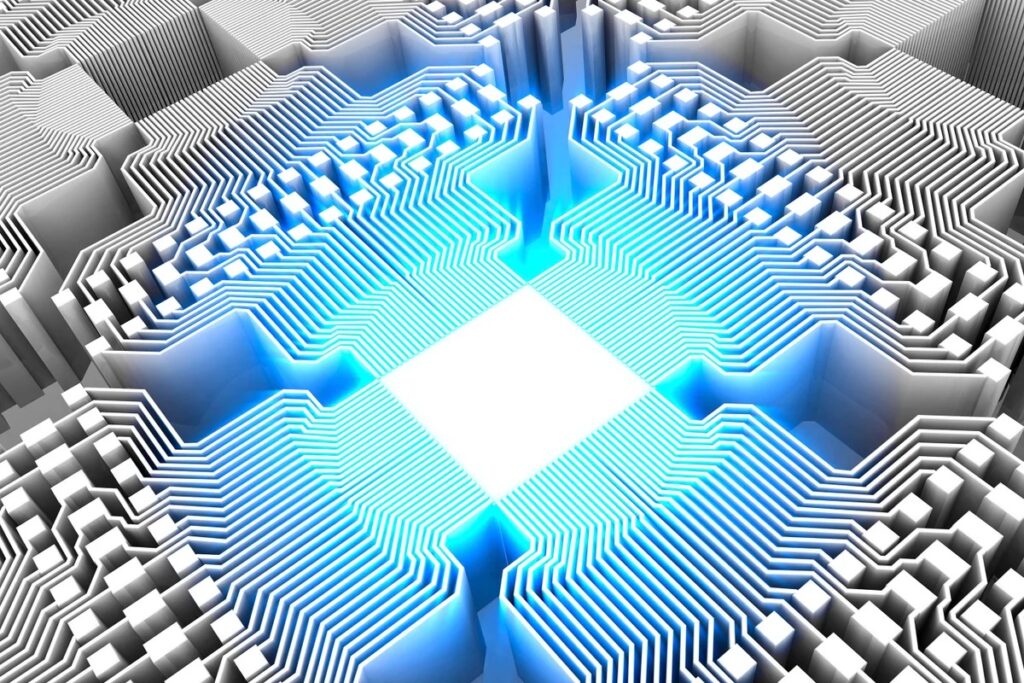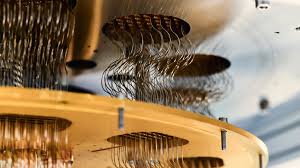Google has announced a major breakthrough in quantum computing with its new algorithm, Quantum Echoes, which performs calculations 13,000 times faster than a leading supercomputer. The discovery marks a big step toward practical quantum computers that could revolutionize medicine, materials science, and artificial intelligence, though experts say real-world use is still a few years away.

Artist’s concept of a quantum computer chip.-Alfred Pasieka/Science Photo Library
By Newswriters.in Technology Desk
Google has announced a major leap in quantum computing with a new algorithm called “Quantum Echoes”, which it says can perform tasks 13,000 times faster than the world’s top supercomputers. The breakthrough, detailed in the journal Nature, could open new frontiers in science — from designing new medicines to developing stronger materials — though experts say it may still take years before such computers are used in real-world applications.
According to Google, this is the first time a quantum computer has successfully run a verifiable algorithm that goes beyond the ability of traditional supercomputers. In simple terms, it means the machine solved a problem that even the fastest classical computers could not handle.
The algorithm helped Google’s quantum computer calculate the structure of a molecule, a key step in understanding how atoms bond and interact — something that could eventually help scientists create new drugs or materials. Michel Devoret, Google’s chief scientist for Quantum AI and a recent Nobel laureate, called it “a new step toward full-scale quantum computation.”
However, researchers caution that this achievement, while historic, focuses on a narrow scientific problem. “It’s not yet a revolutionary change,” said Winfried Hensinger, a professor of quantum technologies at the University of Sussex. “But it’s another convincing proof that quantum computers are becoming more powerful.”
What Makes Quantum Computers Different
Unlike traditional computers, which store information in bits (either 0 or 1), quantum computers use qubits — particles like electrons or photons that can be 0 and 1 at the same time. This property, known as superposition, allows quantum computers to process vast amounts of information simultaneously.
This gives them the potential to solve problems that would take even the best supercomputers thousands of years to finish. However, qubits are extremely delicate — they can lose their quantum state easily when exposed to heat, light, or magnetic interference. For this reason, quantum computers must operate in ultra-cold, controlled environments, often just above absolute zero.
Still Years Away from Real-World Use
Experts estimate that practical, fault-tolerant quantum computers — those capable of handling everyday complex problems — may still be several years away. To achieve that, machines would need hundreds of thousands or even millions of qubits, far more than today’s systems can support.
Google’s vice president of engineering, Hartmut Neven, remains optimistic. “With Quantum Echoes, we believe that within five years, we’ll start seeing real-world applications that are only possible with quantum computers,” he said.
Beyond research, Google also believes that quantum computers will play a major role in artificial intelligence, generating new types of data that could make AI models smarter and faster.
Still, the growing power of quantum computing has raised concerns in other areas. Cybersecurity experts warn that quantum machines could one day break the encryption that protects banking systems, online communications, and government data. This has prompted calls for developing quantum-proof encryption before the technology becomes mainstream.
For now, Google’s “Quantum Echoes” marks another giant step in a fast-moving field. It’s a glimpse into the future — one where computers may not just calculate faster, but think in entirely new ways.




